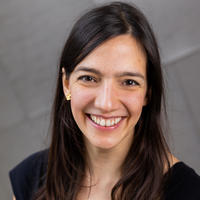
Ariadna Mondragón Botero, a graduate student in Plant and Microbial Biology, received a 2023 Mestenhauser Student Award for Excellence in Campus Internationalization. Botero studies dry tropical forests in the Powers lab. She shared a bit about her research interests and efforts to bridge cultures as an international student.
Can you say a bit about your work in tropical dry forests? How did you get involved in that area of research?
I started my work as a biologist in the Colombian rainforests and páramos. Although I grew up in a country with beautiful dry forests, I never worked in that ecosystem until I went for the first time to Madagascar to Berenty Reserve for a summer as a volunteer. I went to the south of Madagascar to work with lemurs, but I was immediately fascinated by the uniqueness of the dry forest in the forest reserve where I was working. But I was also struck with how threatened and understudied the dry forests were, not only in Madagascar, but all over the world. So I started by studying the diversity, structure, and also exploring the functional ecology of this ecosystem. I have also been working in forest restoration as a way to expand and connect the existing dry forest fragments in Berenty Reserve.
I was super lucky to join Dr. Jennifer Powers’ lab at the UMN, where we are all dry forest enthusiasts and work in various dry forests around the world. It’s not easy to work in the dry forests! Especially not in the spiny thickets in Madagascar. It is very hot during the summer, and we have to deal with scratches from all those tree spines. But at the end of the day, it is extremely rewarding. I know that we are working towards the conservation of an overlooked ecosystem, but a very biodiverse and unique one.
You received the 2023 Mestenhauser Award for your efforts to share your culture and foster an appreciation for Colombia here in Minnesota. What motivates you to do that work?
Colombia is a country that has dealt with the burden of violence, corruption, and drug trafficking for more than 60 years. But Colombia is much more than that. In my time at the University of Minnesota, I have actively worked to destigmatize countries like mine and be able to share the cultural, musical, gastronomic, and natural wealth that also defines us. My goal is to ignite people’s curiosity about the world and help them learn about and appreciate international diversity.
How has your experience as a scientist informed the way you approach conversations about culture and how you think about the value of diversity?
I am fascinated by diversity, and I spend my days studying it. As a biologist, I have been taught to observe the differences among the different components of our study systems, but also notice patterns and commonalities. I approach the natural world with curiosity, admiration, and respect, and I think I approach cultural diversity in the same way. I am fascinated by the myriad of cultures in our world, and I enjoy learning about other languages, music, dances, or belief systems. I recognize that we are all so different but at the same time we are all human, and that there are common threads that unite us all.
Where in Colombia are you from? What aspect of Colombian culture do you enjoy sharing most?
Hometown: Cali, a city in the south of the country. We are known as the world salsa capital, and a lot of things in my city revolve around salsa dancing and music in general. I love sharing that part of our culture with people, because I think that enjoying music and dancing is a universal feeling and it is an easy way to connect with others.
 Global
Global